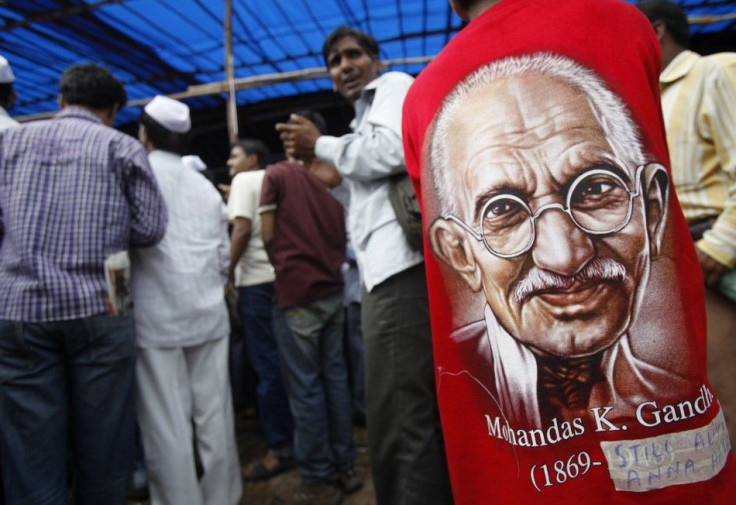Indian Government Clamps Down On Anti-Corruption Campaigner Anna Hazare

In the latest round of confrontations between India's government and the country's five-month-old anti-corruption movement led by activist Anna Hazare, the ruling party's most seasoned politicians found themselves grossly out-maneuvered.
Hazare, whose arrest a day earlier sparked protests across the country, rejected the government's offer for his release, choosing to remain in prison until he is permitted to go on a hunger strike in a park in New Delhi.
Tihar Jail, where he is likely to remain overnight, quickly became an epicenter for demonstrations, with thousands thronging its gates, demanding Hazare's right to peaceful protest. They chanted slogans, wore white caps reminiscent of India's freedom struggle, sang nationalistic songs, organized sit-ins and peaceful marches, and raised banners of “India against corruption” into the night.
Large numbers also gathered in parks and public spaces in other cities such as Mumbai, Ahmedabad, Chennai and Bangalore, to participate in what Hazare has dubbed “India's second war of independence.”
“If we lose this chance we will not get it again,” said Kangeyan Gangadharan, a 36-year old management professional who has taken 15 days off work to help organize the campaign at Bangalore's Freedom Park. “I have been waiting for a platform like this for very long.”
At the same venue, 73-year-old Dharmaraj M.K. was among several dozen people who are on an indefinite fast. He supports the movement, he said, because he has suffered repeatedly at the hands of India's corrupt bureaucracy, from acquiring a license to construct his house to pushing his pension paperwork.
Corruption scandals of a much larger magnitude have wracked India in the recent past. Illegal mining activities unearthed in the state of Karnataka resulted in the removal of its Chief Minister less than a month ago; the shoddy and graft-ridden organization of the 2010 Commonwealth Games brought India widespread embarrassment; and the sale of cell phone spectrum at throw-away prices exposed the country's top political brass.
Anna Hazare and his supporters have, for months now, demanded that the government create a strong and independent body, known as a Lokpal, to tackle India's deep-rooted corruption.
Hazare, a believer in the Gandhian methods of non-violent protest and civil disobedience, undertook a fast unto death in April, mobilizing a grassroots movement that brought students and professionals from India's large middle class, widely believed to be cynical, onto the streets.
In an effort to mollify the surging public sentiment, the government created a special committee including Hazare, prominent members of the civil society, and lawmakers, to draft an anti-corruption bill. But because of disagreements on the scope of the legislation, the discussions seemed destined for a stalemate.
Hazare and his supporters are demanding a sweeping law that makes the Prime Minister and the judiciary open to the Lokpal's scrutiny, measures seen by the government as disruptive to India's balance of powers. Government leaders have also asserted the Parliament's right to make laws, describing Hazare's demands as a “misconceived” attempt to co-opt those powers.
Earlier this month, the government tabled its version of the Lokpal bill in Parliament, drawing fresh criticism from Hazare and his aides, who have described the proposed legislation as an eyewash. Soon after, Hazare announced a hunger strike to recommence his movement, requesting the police's permission to protest in New Delhi's Jayprakash Narayan Park.
Under the pretext of maintaining law and order, the Delhi police imposed 22 conditions, allowing a maximum of 5000 protestors and imposing a three-day cap on the fast. On Aug. 15, India's 64th Independence Day, Hazare made it clear he had no intentions of abandoning his fast at the park, resulting in his arrest.
As public bafflement turned to outrage, chaos broke out in Parliament where India's beleaguered Prime Minister, Manmohan Singh, defended Hazare's arrest. Opposition leaders tore into the government, slamming it as “arrogant,” and calling its actions a throwback to the time when emergency was imposed in the country in 1975 by Indira Gandhi.
Opposition leader Arun Jaitley asked: How can the government, against whom the protest is being organized, decide who should protest, how they should come for the protest, and what should the size of the protest be?
© Copyright IBTimes 2024. All rights reserved.





















